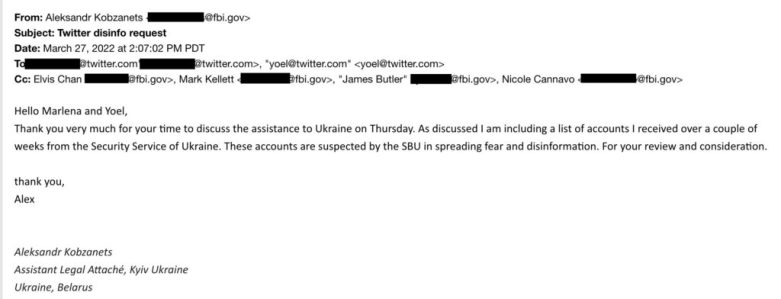Authored by Aaron Maté via Substack,
In March 2022, an FBI Special Agent sent Twitter a list of accounts on behalf of the Security Service of Ukraine (SBU), Ukraine’s main intelligence agency. The accounts, the FBI wrote, “are suspected by the SBU in spreading fear and disinformation.” In an attached memo, the SBU asked Twitter to remove the accounts and hand over their user data.
The Ukrainian government’s FBI-enabled targets extend to members of the media. The SBU list that the FBI provided to Twitter included my name and Twitter profile. In its response to the FBI, Twitter agreed to review the accounts for “inauthenticity” but raised concerns about the inclusion of me and other “American and Canadian journalists.”
The FBI’s attempt to ban Twitter accounts at the request of Ukrainian intelligence is among the most overt requests for censorship revealed to date in the Twitter Files, a cache of leaked communications from the social media giant.
The FBI’s censorship request was relayed in a March 27th, 2022 email from FBI Special Agent Aleksandr Kobzanets, the Assistant Legal Attaché at the US Embassy in Kyiv, to two Twitter executives. Four FBI colleagues were copied on the exchange.
“Thank you very much for your time to discuss the assistance to Ukraine,” Kobzanets wrote. “I am including a list of accounts I received over a couple of weeks from the Security Service of Ukraine. These accounts are suspected by the SBU in spreading fear and disinformation. For your review and consideration.”
The document, drafted by Ukraine’s SBU, contained 163 accounts, including mine. (The list is numbered to 175, but some accounts have two corresponding numerical lines).
The listed Twitter profiles, the SBU alleged, have been “used to disseminate disinformation and fake news to inaccurately reflect events in Ukraine, justify war crimes of the Russian authorities on the territory of the Ukrainian state in violation of international law.”
In order “to stop Russian aggression on the information front,” the SBU continued, “we kindly ask you to take urgent measures to block these Twitter accounts and provide us with user data specified during registration.”
The SBU expressed its “gratitude for the existing level of interaction.”
If granted, the users on the list would not only have been banned from Twitter but had their phone number, date of birth, and email address disclosed to both the FBI and SBU.
In response, Yoel Roth, Twitter’s then-Head of Trust and Safety, informed Special Agent Kobzanets and his FBI colleagues that Twitter would “review the reported accounts under our Rules.” But he warned that the list included “a few accounts of American and Canadian journalists (e.g. Aaron Mate).” Therefore, Roth said, Twitter’s review would “focus first and foremost on identifying any potential inauthenticity.”
The Ukrainian government’s FBI-enabled list of accounts marked for censorship extends to members of the media.
The SBU list that the FBI provided to Twitter included my name and Twitter profile, as well was several Russian journalists. pic.twitter.com/U7X9FNUYj8
— Aaron Maté (@aaronjmate) June 7, 2023
The FBI’s attempt to ban Twitter accounts at the request of Ukrainian intelligence is among the most overt requests for censorship revealed to date in the Twitter Files.
The FBI described the suppression effort as “assistance to Ukraine.”
— Aaron Maté (@aaronjmate) June 7, 2023
The FBI declined to answer my questions about its aid to Ukrainian intelligence censorship efforts.
“While we appreciate your inquiry, as a matter of practice we do not confirm, deny, or otherwise comment on specific interactions nor confirm the veracity of correspondence,” FBI…
— Aaron Maté (@aaronjmate) June 7, 2023
New internal Twitter emails confirm, show Ukrainian intelligence pushing to ban American journalists via FBI https://t.co/29drH0Xccl
— Lee Fang (@lhfang) June 7, 2023


